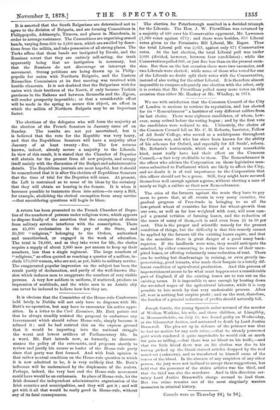The cries of the farmers against the rents they have
to pay seem to prove that, at all events in very many counties, the gradual progress of Free-trade in bringing to us all the low-priced wheat of countries far fitter for wheat-growth than our own, as well as far less weighted with rent, will soon com- pel a general revision of farming leases, and the reduction of the rents of many of them,—it is said even from 25 to 30 per cent. This is the proper and scientific remedy for the present condition of things, but the difficulty is that this remedy cannot be applied by the farmers till the existing leases expire, and that in the meantime there is great danger of a good many bank- ruptcies. If the landlords were wise, they would anticipate the mischief, by either consenting to revise the terms of their unex- pired leases, or offering voluntarily some reduction of rent. There can be nothing but disadvantage in ruining, or even greatly im- poverishing, good tenants, who made their bargain in a totally dif- ferent condition of agricultural production. And this process of impoverishment seems to be what must happen over a considerable part of England, if all the existing leases are to run out on the existing terms. It is impossible to save enough by beating down the wretched wages of the agricultural labourer, while it is very possible to lose much by that very undesirable process. After all, rent is nothing but surplus profit ; and on the rent, therefore, the burden of a general reduction of profits should naturally fall.


































 Previous page
Previous page